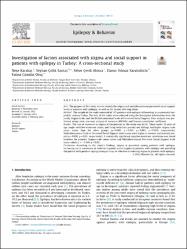| dc.contributor.author | Karakaş, N., Sarıtaş, S. Ç., Aktura, S. Ç., Karabulutlu, E. Y., Oruç, F. G. | |
| dc.date.accessioned | 2022-03-10T13:04:31Z | |
| dc.date.available | 2022-03-10T13:04:31Z | |
| dc.date.issued | 12 Ocak 2022 | en_US |
| dc.identifier.citation | Karakaş, N., Sarıtaş, S. Ç., Aktura, S. Ç., Karabulutlu, E. Y., & Oruç, F. G. (2022). Investigation of factors associated with stigma and social support in patients with epilepsy in Turkey: A cross-sectional study. Epilepsy & Behavior, 128, 108572. | en_US |
| dc.identifier.uri | https://doi.org/10.1016/j.yebeh.2022.108572 | |
| dc.identifier.uri | https://hdl.handle.net/20.500.12899/591 | |
| dc.description.abstract | Aim: The purpose of this study was to identify the stigma and multidimensional perceived social support
levels of patients with epilepsy, as well as the factors affecting them.
Method: The sample of the study consisted of 115 patients with epilepsy followed up in a university hos pital in eastern Turkey. The data of the study were collected using the descriptive information form, the Jacoby Stigma Scale, and the Multidimensional Scale of Perceived Social Support. Data analysis was per formed using t-test, one-way analysis of variance (ANOVA), and Pearson correlation coefficient.
Results: The rate of exposure to stigma of the patients in the study was 62.4%. Those under 30 years of
age, single, with low economic status, and living with their parents and siblings had higher stigma scale
mean scores than the other groups (p = 0.001, p < 0.001, p = 0.001, p = 0.019, respectively) Multidimensional Scale of Perceived Social Support total scores were higher in women and married peo ple (p = 0.020, p = 0.01, respectively). A statistically significant negative moderate correlation was found between the patients’ Stigma scale mean values and Multidimensional Perceived Social Support Scale mean values (r = 0.568. p < 0.01).
Conclusion: According to the study’s findings, stigma is prevalent among patients with epilepsy.
Increasing social awareness in order to augment social support in patients with epilepsy and providing
the patient with positive coping strategies may be effective in reducing stigma in patients with epilepsy | en_US |
| dc.language.iso | eng | en_US |
| dc.publisher | Elsevier | en_US |
| dc.relation.isversionof | 10.1016/j.yebeh.2022.108572 | en_US |
| dc.rights | info:eu-repo/semantics/openAccess | en_US |
| dc.subject | Epilepsy | en_US |
| dc.subject | Social support | en_US |
| dc.subject | Stigma | en_US |
| dc.title | Investigation of factors associated with stigma and social support in patients with epilepsy in Turkey: A cross-sectional study | en_US |
| dc.type | article | en_US |
| dc.department | MTÖ Üniversitesi, Tıp Fakültesi, Dahili Tıp Bilimleri Bölümü | en_US |
| dc.contributor.institutionauthor | Karakaş, Neşe | |
| dc.identifier.startpage | 1 | en_US |
| dc.identifier.endpage | 6 | en_US |
| dc.relation.journal | Epilepsy & Behavior | en_US |
| dc.relation.publicationcategory | Makale - Uluslararası Hakemli Dergi - Kurum Öğretim Elemanı | en_US |


















